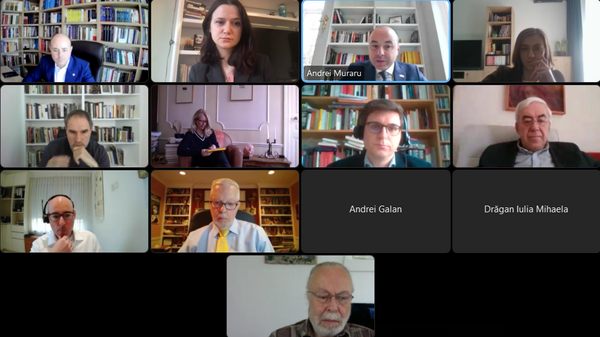On March 26, SNSPA organised an online roundtable to present the preliminary results of a research project that connects scholars from CIVICA – The European University of Social Sciences. “When the Law is Silent: Hate Crime Prosecution and Implicit Bias in Law Enforcement Agencies (SILAW)” is the title of this project, which was the result of a CIVICA Research call for cutting-edge collaborative research proposals in early 2021 and gathers scholars from SNSPA, CEU, and Sciences Po. The SILAW project investigates how implicit bias affects judiciary decisions in cases of antisemitism. The presence of prejudices among the police, judge and prosecutor corps can indicate undetected antisemitism within societies, visible through a low prosecution rate.
The event, “The Power of Prosecution Patterns: Addressing Antisemitism in Romania, Bulgaria, and Germany,” started with opening remarks made by H.E. Andrei Muraru, Ambassador of Romania to the United States, an SNSPA professor and SILAW team leader, along with the rest of the SILAW research team: Prof Nadège Ragaru, Sciences Po Paris, Center for International Studies, CERI-CNRS; Prof Constantin Iordachi, CEU, Vienna, History Department; Oana Mihalache, PhD researcher, SNSPA, who also acted as moderator of the event. The research team was joined by Andreea Dobriță, PhD researcher in Sociology, SNSPA, and research coordinator in Bucharest.
Speakers at the event were renowned academics in the field, authors, researchers and practitioners from Romania, Bulgaria, Germany, France, and the United States:
- Alexandru Muraru, Member of Parliament and Special Representative of the Romanian Government for Promoting Memory Policies, Combating Antisemitism and Xenophobia.
- Michael Shafir, Professor, Doctoral School of International Relations and Strategic Studies, Faculty of History, Babeș-Bolyai University, Cluj-Napoca, Romania.
- Daniel Poensgen, Scientific Advisor at the Federal Association of Departments for Research and Information on Antisemitism (Bundesverband RIAS).
- Krasimir Kanev, Chairperson, Bulgarski Helsinki Committee.
- Jacob Comforty, writer, documentary filmmaker and oral historian, author of “The Stolen Narrative of the Bulgarian Jews and the Holocaust”.
- William Brustein, Special Assistant to the President for Global Affairs and Eberly Family Distinguished Professor of History, West Virginia University.
- Marc Neugröschel, researcher and journalist, Hebrew University of Jerusalem.

Preliminary results discussed during the event revealed the first stages of SILAW’s empirical research involving five SNSPA students assisting in conducting the empirical research in Bucharest, Romania. The research team identified 170 prosecutor’s offices with criminal cases under the two pieces of legislation that address cases of antisemitism in Romania. Looking at legislative frameworks in Romania, Bulgaria, and Germany, the first results showed that they have similar and dissimilar patterns regarding antisemitism.
“Our main empirical study takes place in Romania, but the case of Romania is not singular and, if placed on a continuum, could be situated between Bulgaria and Germany, but closer to the former. In the case of Bulgaria, there is a complete absence of prosecution for antisemitism and a perception that the phenomenon is not a problem in society. In Germany, the number of incidents is increasing and correlates with a low criminalisation record,” says Prof Andrei Muraru, the project team leader.
The next phase of SILAW’s research is ongoing and involves reaching out to judges and police officers, and the final results of the project are expected in early 2023.
Watch a recording of the event here.
SILAW is one of the first projects selected under CIVICA’s first call for collaborative research winning projects, which marked the launch of CIVICA Research – the alliance’s long-term research and innovation agenda.
CIVICA Research brings together researchers from eight leading European universities in the social sciences to contribute knowledge and solutions to the world’s most pressing challenges. The project aims to strengthen the research & innovation pillar of the European University alliance CIVICA. CIVICA Research is co-funded by the EU’s Horizon 2020 research and innovation programme. Subscribe to the newsletter to stay updated with CIVICA Research developments and opportunities.
Written by SNSPA’s editorial team
*This article was originally published on the website of CIVICA – The European University of Social Sciences.



